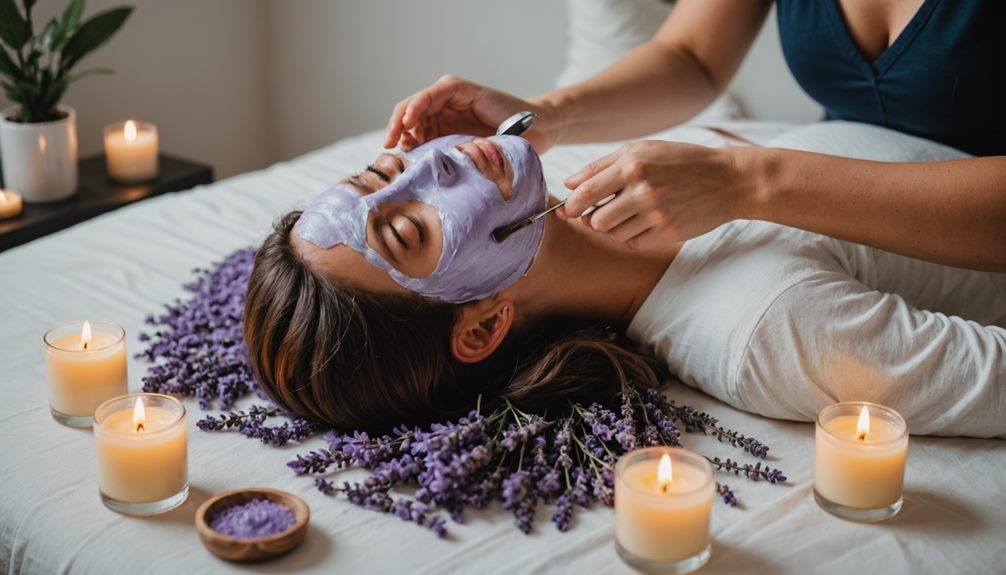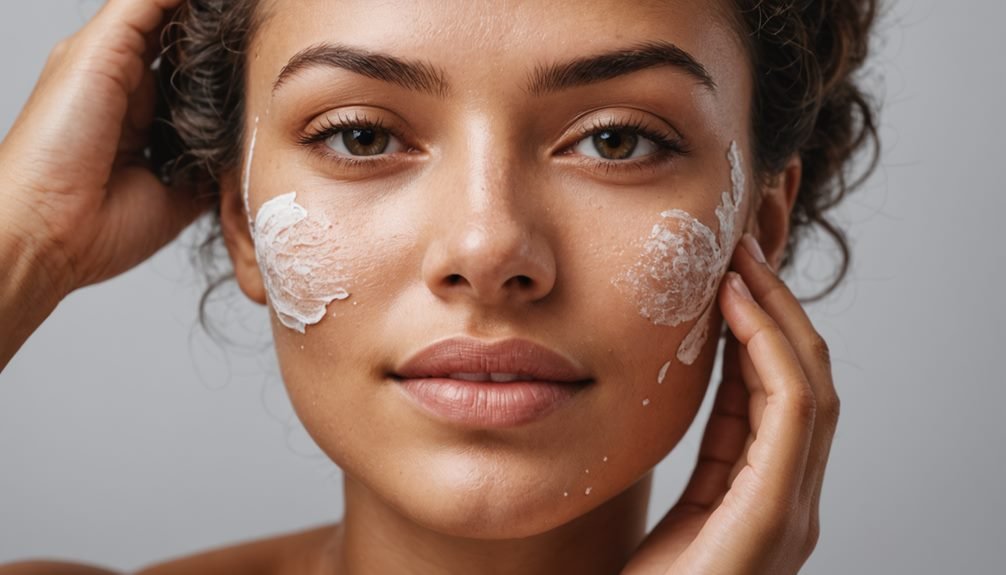Postpartum Skincare Tips for Glowing Skin
Imagine your skin as a delicate canvas reflecting the profound journey of motherhood. As you navigate the postpartum period, nurturing your skin is a vital part of self-care. Discover how simple yet effective skincare tips can help you achieve that coveted glow, bringing out your natural radiance effortlessly. From hydrating moisturizers to powerful antioxidants, each step plays a role in enhancing your skin's luminosity. Stay tuned to uncover the secrets to postpartum skincare for a glowing complexion that mirrors your inner vitality.
Importance of Skincare Routine

Establishing a consistent skincare routine postpartum is crucial for maintaining healthy and radiant skin. Utilizing the right skincare products and adopting healthy habits can make a significant difference in how your skin looks and feels during this delicate period.
Skincare products play a vital role in postpartum skincare. Opt for gentle cleansers, hydrating serums, and moisturizers rich in antioxidants to nourish and protect your skin. Products containing ingredients like hyaluronic acid and vitamin C can help restore hydration and brightness, combating the effects of hormonal changes postpartum.
Incorporating healthy habits into your skincare routine is equally important. Ensure you stay hydrated by drinking plenty of water throughout the day. Eating a balanced diet rich in fruits, vegetables, and omega-3 fatty acids can also contribute to healthier skin postpartum. Additionally, getting enough rest and managing stress levels can positively impact your skin's overall health and appearance.
Hydration Is Key
To maintain optimal skin health postpartum, ensuring proper hydration is essential. Hydrated skin is healthy skin, and during this postpartum period, your body needs extra care. Here are some key points to keep in mind:
- Water intake: Drink plenty of water throughout the day to keep your skin hydrated from within. Adequate water intake helps flush out toxins and promotes a radiant complexion.
- Moisturizer choice: Select a hydrating and nourishing moisturizer suitable for your skin type. Look for ingredients like hyaluronic acid or ceramides to lock in moisture and improve skin elasticity.
- Consistency is key: Establish a routine of drinking water and applying moisturizer regularly to maintain skin hydration levels.
- Consider a humidifier: Using a humidifier in your room can help combat dry indoor air, keeping your skin from becoming dehydrated.
Gentle Cleansing Techniques

For optimal postpartum skincare, adopting gentle cleansing techniques is crucial. After giving birth, your skin may become more sensitive, making it prone to postpartum acne. When selecting a cleanser, opt for products specifically formulated for sensitive skin. Look for gentle, fragrance-free cleansers that won't strip your skin of its natural oils. Avoid harsh ingredients like alcohol or strong fragrances that can further irritate sensitive postpartum skin.
When cleansing your face, use lukewarm water instead of hot water to prevent excessive drying. Gently massage the cleanser onto your skin using circular motions, then rinse thoroughly with water. Pat your face dry with a soft towel, being careful not to rub or tug at your skin. This gentle approach will help maintain your skin's natural moisture barrier and prevent exacerbating postpartum acne.
Incorporate Vitamin C
Considering the benefits it can offer to your postpartum skincare routine, incorporating Vitamin C is a wise choice. Vitamin C is a powerhouse ingredient that can help you achieve glowing skin postpartum. Here's why you should consider adding it to your skincare regimen:
- Brightening serums: Vitamin C is known for its ability to brighten the skin and fade postpartum pigmentation, giving you a more even complexion.
- Antioxidant benefits: Vitamin C is a potent antioxidant that can protect your skin from free radical damage caused by environmental stressors, which is especially beneficial during the postpartum period.
- Enhanced collagen production: Vitamin C stimulates collagen production, helping to improve skin elasticity and reduce the appearance of fine lines and wrinkles.
- Skin repair and regeneration: Vitamin C aids in the repair and regeneration of skin cells, promoting a healthier skin barrier and overall skin health.
Incorporating Vitamin C into your postpartum skincare routine can help you achieve that radiant, healthy glow you deserve.
Sun Protection Is a Must

Ensuring adequate sun protection is essential for your postpartum skincare routine. Sunscreen application is crucial to shield your skin from harmful UV rays that can lead to premature aging, dark spots, and skin damage. Opt for a broad-spectrum sunscreen with at least SPF 30 and reapply every two hours, especially if you're spending time outdoors.
UV protection is vital year-round, regardless of the weather. Even on cloudy days, UV rays can penetrate through clouds and cause damage to your skin. Make sunscreen application a daily habit, even if you're indoors, as UV rays can still reach your skin through windows.
Choose a sunscreen that suits your skin type to ensure comfort and effectiveness. Look for non-comedogenic formulas if you have oily or acne-prone skin, and opt for gentle, mineral-based sunscreens if you have sensitive skin.
Prioritizing sun protection won't only prevent sun damage but also promote healthy, glowing skin throughout your postpartum journey.
Get Sufficient Sleep
To maintain the health and appearance of your skin following childbirth, ensuring you get sufficient sleep is paramount. Quality sleep plays a crucial role in skin rejuvenation and overall well-being during the postpartum period. Here are some key points to consider:
- Sleep Quality: Aim for uninterrupted sleep cycles to allow your body to undergo its natural repair processes.
- Restorative Rest: Prioritize deep, restful sleep to promote collagen production and cell regeneration for healthy skin.
- Establish a Routine: Create a calming bedtime routine to signal your body that it's time to wind down and prepare for rest.
- Optimize Your Environment: Make your sleep space conducive to relaxation by keeping it dark, quiet, and at a comfortable temperature.
Reduce Stress Levels

Amidst the whirlwind of new responsibilities and adjustments that come with postpartum life, managing stress levels is a crucial aspect of self-care that directly impacts your skin health. High stress levels can trigger skin issues like acne, eczema, and dullness.
To combat this, incorporating meditation techniques and relaxation exercises into your daily routine can work wonders. Meditation techniques, such as mindfulness meditation or guided imagery, can help calm your mind and reduce anxiety levels.
Engaging in relaxation exercises like deep breathing, progressive muscle relaxation, or yoga can also aid in lowering stress hormones in your body, which in turn can promote healthier skin.
Include Omega-3 Fatty Acids
For optimal postpartum skincare, incorporating omega-3 fatty acids into your diet plays a significant role in promoting skin health. Omega-3 fatty acids are essential nutrients that can benefit your skin by supporting its natural barrier function and overall hydration levels. Including dietary supplements rich in omega-3 fatty acids can help nourish your skin from within, leading to a healthy and radiant complexion.
- Enhances Skin Barrier: Omega-3 fatty acids help strengthen the skin barrier, reducing moisture loss and protecting against environmental stressors.
- Improves Skin Hydration: By incorporating omega-3 fatty acids into your diet, you can improve skin hydration levels, leading to a soft and supple complexion.
- Reduces Inflammation: These fatty acids have anti-inflammatory properties that can help calm irritated skin and reduce redness.
- Promotes Skin Elasticity: Omega-3 fatty acids support collagen production, enhancing skin elasticity and firmness for a youthful appearance.
Including omega-3 fatty acids in your postpartum skincare routine can help address skin concerns and promote a healthy skin barrier, leading to a glowing complexion.
Exfoliate Regularly

Strengthening your postpartum skincare routine involves more than just nourishing your skin from within – it also requires regular exfoliation to maintain a healthy complexion. Exfoliating helps remove dead skin cells, allowing your skin to better absorb moisturizers and other skincare products. When choosing exfoliants, opt for natural ingredients to avoid harsh chemicals that may irritate sensitive postpartum skin. DIY scrubs are a fantastic way to exfoliate naturally while customizing the ingredients to suit your skin's unique needs. Here is a simple table to guide you in creating your own DIY scrubs:
| Exfoliant | Benefits |
|---|---|
| Coffee Grounds | Stimulates circulation |
| Oatmeal | Soothes and calms the skin |
| Sugar | Gentle exfoliation |
Incorporating regular exfoliation using natural ingredients and DIY scrubs into your postpartum skincare routine can help reveal a glowing complexion while being gentle on your skin.
Consult a Dermatologist if Needed
To ensure optimal care for your postpartum skin, consulting a dermatologist may be necessary if you encounter persistent skin issues or concerns that require professional expertise. Dermatologists are specialized in diagnosing and treating various skin conditions, providing you with the professional advice and medical guidance needed to address specific postpartum skin issues.
Here are some reasons why seeking a dermatologist's help can be beneficial:
- Accurate Diagnosis: Dermatologists can accurately diagnose any skin conditions you may be experiencing postpartum, ensuring you receive the appropriate treatment.
- Customized Treatment Plans: They can create personalized treatment plans tailored to your skin type and concerns, optimizing the effectiveness of the skincare regimen.
- Advanced Procedures: Dermatologists can perform advanced procedures like chemical peels or laser treatments to target specific skin issues more effectively.
- Product Recommendations: They can recommend medical-grade skincare products that are safe and suitable for your postpartum skin, helping you achieve a healthy and radiant complexion.
Frequently Asked Questions
Can I Use My Regular Skincare Products During Postpartum?
Yes, you can use your regular skincare products during postpartum, but it's essential to consider product compatibility due to hormonal changes. Your skin may be more sensitive postpartum, so adjusting your routine to meet your skin's needs is crucial.
Keep an eye out for any reactions to your usual products and be prepared to switch to gentler options if necessary. Prioritize products that cater to postpartum skin requirements for a healthy glow.
Are There Specific Ingredients to Avoid for Postpartum Skincare?
When it comes to postpartum skincare, it's crucial to be mindful of safe ingredients and potential skincare concerns.
Some ingredients to avoid during this time include retinoids, hydroquinone, and salicylic acid. These compounds can potentially be harmful while nursing or recovering from childbirth.
Opt for gentle, hydrating ingredients like hyaluronic acid, vitamin C, and peptides to keep your skin healthy and glowing postpartum.
How Soon Can I Start Using Anti-Aging Products Postpartum?
You can start using anti-aging products postpartum once your hormones stabilize and your skin sensitivity decreases. It's advisable to wait around 6-12 months to ensure your skin has adjusted to hormonal changes.
When incorporating anti-aging products, introduce them gradually into your skincare routine to monitor any adverse reactions. Prioritize hydrating and gentle ingredients to address anti-aging concerns while maintaining skin health postpartum.
Can Postpartum Skincare Help With Hormonal Acne?
Yes, postpartum skincare can indeed help with hormonal acne. Hormonal imbalances after childbirth can trigger acne flare-ups, but with the right skincare routine, you can manage it effectively.
Incorporating gentle yet effective acne treatments suitable for postpartum use can help address this concern. By focusing on postpartum acne treatment within your skincare regimen, you can work towards achieving clearer and healthier skin during this time of hormonal adjustment.
Is It Safe to Use Retinol Products While Breastfeeding?
While breastfeeding, it's best to avoid retinol products due to the lack of research on their safety during this period. However, there are safe retinol alternatives like bakuchiol or gentle exfoliants containing lactic acid.
Remember, skin sensitivity can be heightened postpartum, so choose products carefully.
Always consult with your healthcare provider or a dermatologist for personalized advice on skincare while breastfeeding to ensure the safety of both you and your baby.
Conclusion
Now, embrace your postpartum journey with radiant skin that glows like the sun at dawn. Hydrate, cleanse, protect, and nourish your skin with care and expertise. Let the light of vitamin C illuminate your complexion, while the gentle touch of exfoliation unveils your natural radiance. Remember, consult a dermatologist for tailored solutions that elevate your skincare routine to new heights. Embrace the glow, mama, you deserve it.






